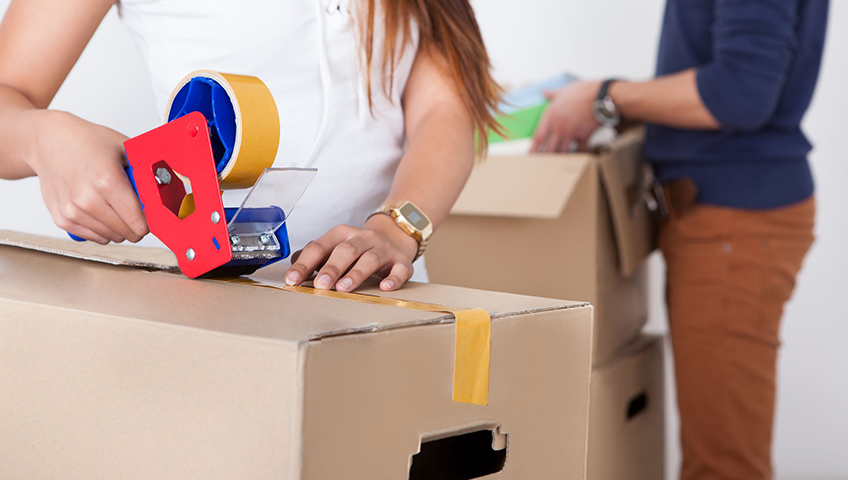Get ready, things are about to get hectic. Moving house is no easy task. From budgeting for the move to managing a moving company, the list of things to do is never-ending.
If you are in the process of preparing to move into your first house, reading this article should give you some pointers on things you could do to make the move that much easier.
Navigate the article
#1 Putting things away
Before you put anything away, think carefully about it because you are setting a precedent that might linger for years. Do you really want to store your favorite drinking glasses on the top shelf so that they're inconvenient every time you grab one?
Contributor: Steve Silberberg
Company: fitpacking.com
#2 Commit to the move
I have clients that have taped up boxes in their homes. I ask them to tell me about the box and they say, "that box is from three moves ago". When moving into your first house get off on the right foot and unpack fully. Don't think you will only be there a few years and it is a starter home.
You don't know what life will bring and how long you will be in the house. Move in and accept that you live there and hang pictures etc.
Contributor: Ben Soreff
Company: h2horganizing.com
-
Put the DATE that you packed it on the box. This will help with the “3 moves later” issue. You’ll always know how old that “stuff is”… Oh, when you OPEN that box, cross off the date too!
#3 Label boxes on the side not the top
Label boxes on the side, not the top. When boxes get stacked you can’t read the top.
Big moving boxes seem great but someone has to carry it. Two medium boxes can stack and one person can bring upstairs. If two people need to carry think about the time it takes to go around a corner staircase.
Contributor: Ben Soreff
Company: h2horganizing.com
-
Well… weight is just as important as size. Small boxes can be VERY heavy when filled with books so the “two person lift” isn’t always as big a deal as this.
#4 Make sure you leave yourself plenty of time to pack
Everyone has more stuff then they think they have. Have more packing boxes then you think you need. You can always return what you don't use. So many people run out of boxes and end up tossing their stuff into trash bags then end up tossing the trash bags thinking it is trash. Sounds crazy but it happens often.
Contributor: Christina Souretis
Company: KCHomeTeam.evusa.com | Real Estate App
#5 Using self-storage units
If you find yourself having to place some items in storage when moving into your first home due to renovations or other delays, be sure to choose the right size unit for your needs. in the world of self-storage units, bigger equals more money. Before just going with the biggest available unit, take the time to inventory what you actually need to store. Once you have figured out the items to be stored, you can choose the appropriate unit for your needs.
Also, if you find yourself moving some items into your home and putting others in self-storage, make an inventory list for each. It's important to know where all your items are. Your inventory list of stored items should be kept in a safe place at home or in a safe deposit box.
Consider renting a U-Haul to save money. If it's your first home, you might have some items that are a little too big to transport in a car but not big enough to warrant hiring movers.
Contributor: Marshall Weber
Company: stor-it.com
-
Yes, but given the limited time period which you’ll be using it, bigger also equates to having a bit more room to move things around INSIDE the storage unit, which can make access to things in a preferred order a bit easier.
#6 Maintain your property
Now that it is your house, rather than some landlord’s, you will need to be on top of things more rigidly than you have ever been. Even if “taking care of business” is not your forte, there is no escaping these responsibilities. If you want this home to serve you well, you need to maintain it properly. Period.
Contributor: Caleb Backe
Company: mapleholistics.com
-
Or… even better… have someone else maintain it for you, just be sure you’re getting your money’s worth!
#7 ALWAYS keep lists
Keep lists. Don’t keep things in your mind. Put ideas and tasks to paper, or on a list on your phone or computer, and create corresponding reminders to follow up on them and get them done. Some people - like myself - are less industrious by nature, and they need help acquiring good time-management habits. If this sounds like you, then your phone is a great tool for forming better practices and becoming more efficient.
Contributor: Caleb Backe
Company: mapleholistics.com
-
And don’t forget WHERE you put those lists!!! These days putting them in the cloud makes sure you won’t find yourself saying… “Where’s that darn list!!!” 🙂 HAHAHAHA
#8 Think of the day after the move
Yeah, moving day is a pain in everybody’s side, and few come out of it unscathed. It is almost always a logistical nightmare, but think of the day after the move. Have a box or two clearly labeled as ‘day of’ or ‘day after’ boxes, which contain essentials you don’t want to rummage for in the sea of boxes you have made.
Contributor: Caleb Backe
Company: mapleholistics.com
-
Any super essentials can just be put in a box and go with you in your car if you’re driving. This is more of a non-issue unless it’s a really long distance move and you’re not taking your car. In that instance you might not be taking much anyway.
#9 Make sure your house is ready for you
Many homes are sold as is, or with the promise of renovations or modifications prior to closing the deal. Make sure these are done, and insist on them. Contracts can be shifty, and once you sign it may not be easy to renege. Have it inspected by capable professionals. You may not have another shot once you sign that dotted line.
Contributor: Caleb Backe
Company: mapleholistics.com
-
Ask the town inspector if you can. Many times they’re willing to help too. Engage friends who are in the building and/or construction business – pay them if necessary because at least you’ll be confident in their findings.
-
Be wary of “professional inspectors” – they’re typically not worth a plug nickle. These “guarantees” always have caveats such as “we only inspect what we can see, there can be hidden damage blah blah blah blah”. Go crawl around, poke, ask questions
This post was created with our nice and easy submission form. Create your post!











Better yet – while the move is underway, go on a fitpacking adventure with Steve !!!